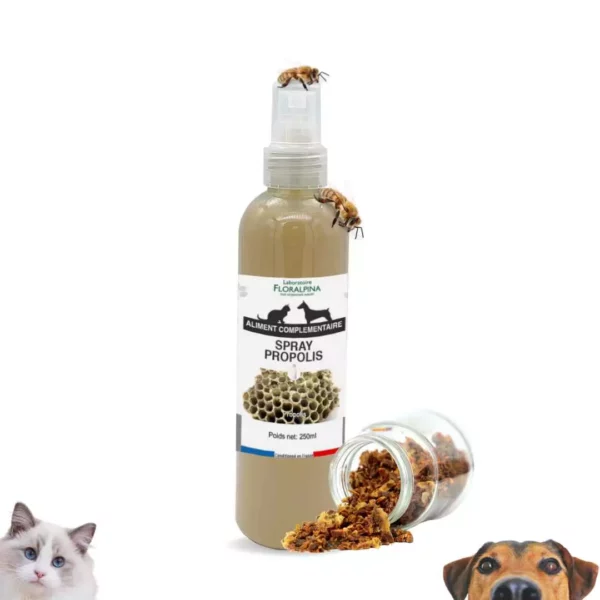Propolis is a resin naturally produced by bees. It is rich in vitamins, minerals and amino acids, making it a very effective product for treating cats and dogs. Propolis is mainly used to treat infections and injuries, but it can also be used to prevent diseases. Many veterinarians recommend propolis to treat infections and injuries of cats and dogs.
Table of Contents
ToggleWhat are the main therapeutic virtues of propolis for cats and dogs?
Propolis has many therapeutic virtues for cats and dogs. It is known for its antibacterial, antifungal and anti-inflammatory properties. Propolis can therefore be used to treat various infections and inflammations. It is also effective against fleas and ticks and can be used as a natural repellent. Propolis is also rich in antioxidants, making it an excellent cure for cellular aging. Propolis is also known for its immunostimulating properties, making it an excellent dietary supplement for cats and dogs.
Spray Propolis
By mouth, nasal or external use, spray propolis will treat sore throats, stimulate immune defenses and heal the wounds of your animals, dog and cat. WITHOUT ALCOHOL. ✅Strengthens immune defenses ✅Facilitates healing ❌Product that may not be appreciated by cats
How to administer propolis to a cat or dog?
Propolis can be administered to a cat or dog by giving it a drop or two of diluted propolis in a little water, three times a day. This helps treat bacterial and viral infections, as well as inflammation of the throat and sinus. Propolis can also be administered as a spray, which will allow the treatment of areas externally. By clicking on the link, you can find a spray propolis for dog and cat.
Are there any contraindications to the use of propolis for cats and dogs?
Propolis has many antibacterial, antifungal and anti-inflammatory properties, making it a very effective product to treat many health problems in cats and dogs. However, there are some contraindications to its use.
Propolis can be toxic to cats and dogs if it is ingested in large quantities. It can also be irritating to the skin and mucous membranes. It is therefore important to follow the veterinary instructions as to the quantity to be given and not to apply it directly to the animal's skin.
In addition, propolis should not be used in animals allergic to the resin produced by bees. If your animal has allergy symptoms (eczema, urticaria, difficulty breathing, etc.), stop use immediately and consult your veterinarian.
Are there any side effects on the use of propolis for cats and dogs?
Side effects reported for propolis used by cats and dogs are rare and benign. Most side effects are the result of topical use of propolis, and the most common side effects are skin sensitivity and itching. Pets may also show signs of nausea, vomiting or diarrhoea after ingesting propolis. In rare cases, propolis can cause a serious allergic reaction in pets. Symptoms of a serious allergic reaction may include lhurticaria, swelling of the respiratory tract and oedema of Quincke. If your pet has allergy symptoms after exposure to propolis, consult a veterinarian immediately.






